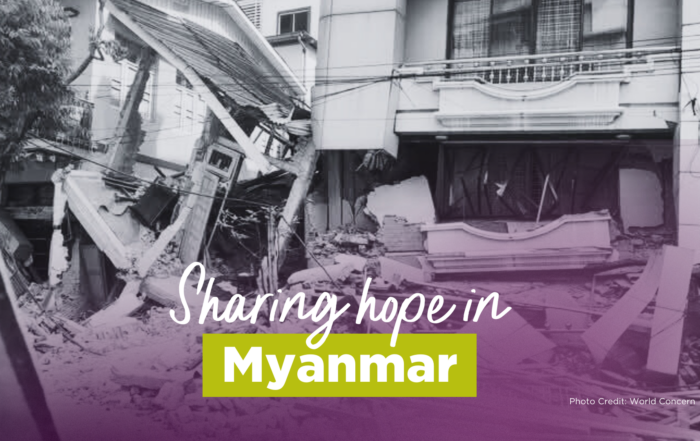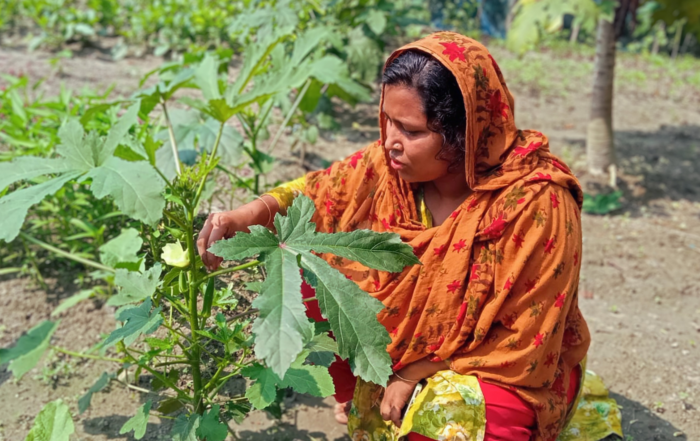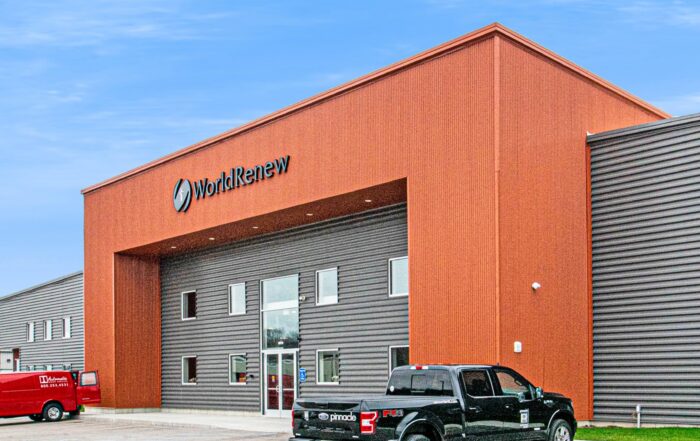When the Mabior family fled conflict in their home country, Sudan, in 2015, they found themselves living in Kakuma, a camp initially set up for the “Lost Boys” of Sudan in the early ’90s. Some readers may remember how 20,000 boys of the Nuer and Dinka ethnic groups who were displaced or orphaned during the 1987-2005 Second Sudanese Civil War. Today, this camp is home to up to 200,000 refugees from around the region.
As the oldest sister, Anyieth quickly found herself the head of the Mabior household with the responsibility of providing for her three younger siblings and her own three children. “I feel like I’m the mother of the whole family,” Anyieth says. When asked about what life was like in Kakuma, Anyieth recalls the tremendous responsibility placed on women to take care of the children. “Not only your own children! Sometimes your siblings or other family pass away and then you’re the one taking care of all these children, making sure that they have food and shoes. Some men, when they come to the camp, will sit idly or run away and escape, leaving all the responsibility to women to handle everything, which is really tough. You may be given some food items, but you need to find firewood or charcoal to cook them. When you go out to look for those things, women get attacked, violated, and injured. It’s risky, but you have to go in order to cook for the children.”
Anyieth’s brother Bol was only 16 when the family arrived at the camp. He explains: “When you are in a refugee camp there’s not much that you can do. You’re just waiting for handouts. You cannot find work. The only good thing in Kakuma was that we were able to go to school. But we never got an opportunity to gain work experience or any skills that we could use.”
 Bol remembers what it felt like to hear that his family was moving out of Kenya to Canada when Maranatha Christian Reformed Church in Lethbridge committed to assist with sponsorship and resettlement through World Renew. “We were delighted when we heard about coming to Canada,” says Bol. “All these ordeals and suffering were coming to an end. We were looking forward to experiencing a new life in a place like Canada. So we were very grateful.”
Bol remembers what it felt like to hear that his family was moving out of Kenya to Canada when Maranatha Christian Reformed Church in Lethbridge committed to assist with sponsorship and resettlement through World Renew. “We were delighted when we heard about coming to Canada,” says Bol. “All these ordeals and suffering were coming to an end. We were looking forward to experiencing a new life in a place like Canada. So we were very grateful.”
“It was a very emotional time,” says Anyieth, “saying goodbye to the people there. They prayed for us, and we prayed for them, but it was tough because I was sad, leaving them and knowing that the situation is not good.” Then the family arrived in Canada and began settling in, which was a time of both excitement and discouragement.
“As you can imagine, it can be very difficult when you arrive in a new country,” Anyieth explains. “You’re seeing a completely different place that you’ve never seen before. You don’t have neighbors to visit, which was different. It was isolating until eventually people from Maranatha Church helped us. They would come and visit sometimes and after that we began to get to know more people and make friends. And that’s made it easier for us.”
“I’m very grateful for the church,” adds Bol. “The most important thing is that I feel they’ve made us part of their family. We are very grateful for the way the church has welcomed us. At first, we still felt a connection to our home that we left behind, even though it’s not secure there,” says Bol. “But we’re also very happy to be in this adopted home – Canada – that has become our home. It feels good when you have a place where there’s security and freedom. . . . It gives you a sense of belonging. I call both ‘home’: my birth country and my adopted country of Canada.”
“Canada should keep doing the work that they’re doing, helping people,” Anyieth says. “So many people still need that help. Do not stop with us. Many people who are still in the camp are women who are caring for many children and family members. They need help, so I wanted to use my voice to tell you we are thankful and grateful for what World Renew and the church are doing and to keep doing that humanitarian work of helping people in need.”
“What I want the Canadian people to know,” Bol smiles, “is that when you help somebody, it’s very rewarding. There are many people who we left in the camp who feel hopeless, but they have a lot of potential. That help that you’re providing is not in vain. Those people will help the country one day.”
Your gift today will allow World Renew’s Refugee Sponsorship and Resettlement team to assist churches in welcoming refugees like the Mabior family to Canada. Support our refugee program and give the gift of hope today.
When the Mabior family fled conflict in their home country, Sudan, in 2015, they found themselves living in Kakuma, a camp initially set up for the “Lost Boys” of Sudan in the early ’90s. Some readers may remember how 20,000 boys of the Nuer and Dinka ethnic groups who were displaced or orphaned during the 1987-2005 Second Sudanese Civil War. Today, this camp is home to up to 200,000 refugees from around the region.
As the oldest sister, Anyieth quickly found herself the head of the Mabior household with the responsibility of providing for her three younger siblings and her own three children. “I feel like I’m the mother of the whole family,” Anyieth says. When asked about what life was like in Kakuma, Anyieth recalls the tremendous responsibility placed on women to take care of the children. “Not only your own children! Sometimes your siblings or other family pass away and then you’re the one taking care of all these children, making sure that they have food and shoes. Some men, when they come to the camp, will sit idly or run away and escape, leaving all the responsibility to women to handle everything, which is really tough. You may be given some food items, but you need to find firewood or charcoal to cook them. When you go out to look for those things, women get attacked, violated, and injured. It’s risky, but you have to go in order to cook for the children.”
Anyieth’s brother Bol was only 16 when the family arrived at the camp. He explains: “When you are in a refugee camp there’s not much that you can do. You’re just waiting for handouts. You cannot find work. The only good thing in Kakuma was that we were able to go to school. But we never got an opportunity to gain work experience or any skills that we could use.”

Bol remembers what it felt like to hear that his family was moving out of Kenya to Canada when Maranatha Christian Reformed Church in Lethbridge committed to assist with sponsorship and resettlement through World Renew. “We were delighted when we heard about coming to Canada,” says Bol. “All these ordeals and suffering were coming to an end. We were looking forward to experiencing a new life in a place like Canada. So we were very grateful.”
“It was a very emotional time,” says Anyieth, “saying goodbye to the people there. They prayed for us, and we prayed for them, but it was tough because I was sad, leaving them and knowing that the situation is not good.” Then the family arrived in Canada and began settling in, which was a time of both excitement and discouragement.
“As you can imagine, it can be very difficult when you arrive in a new country,” Anyieth explains. “You’re seeing a completely different place that you’ve never seen before. You don’t have neighbors to visit, which was different. It was isolating until eventually people from Maranatha Church helped us. They would come and visit sometimes and after that we began to get to know more people and make friends. And that’s made it easier for us.”
“I’m very grateful for the church,” adds Bol. “The most important thing is that I feel they’ve made us part of their family. We are very grateful for the way the church has welcomed us. At first, we still felt a connection to our home that we left behind, even though it’s not secure there,” says Bol. “But we’re also very happy to be in this adopted home – Canada – that has become our home. It feels good when you have a place where there’s security and freedom. . . . It gives you a sense of belonging. I call both ‘home’: my birth country and my adopted country of Canada.”
“Canada should keep doing the work that they’re doing, helping people,” Anyieth says. “So many people still need that help. Do not stop with us. Many people who are still in the camp are women who are caring for many children and family members. They need help, so I wanted to use my voice to tell you we are thankful and grateful for what World Renew and the church are doing and to keep doing that humanitarian work of helping people in need.”
“What I want the Canadian people to know,” Bol smiles, “is that when you help somebody, it’s very rewarding. There are many people who we left in the camp who feel hopeless, but they have a lot of potential. That help that you’re providing is not in vain. Those people will help the country one day.”
Your gift today will allow World Renew’s Refugee Sponsorship and Resettlement team to assist churches in welcoming refugees like the Mabior family to Canada. Support our refugee program and give the gift of hope today.





